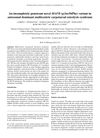 December 2023 in “American journal of medical genetics. Part A”
December 2023 in “American journal of medical genetics. Part A” A new syndrome was linked to two new genetic changes in the MBTPS1 gene in a 14-year-old girl.
 August 2022 in “Frontiers in genetics”
August 2022 in “Frontiers in genetics” A new genetic change in the DSC3 gene is linked to a rare condition causing hair loss and skin blisters in a child.
 2 citations,
August 2022 in “The journal of investigative dermatology/Journal of investigative dermatology”
2 citations,
August 2022 in “The journal of investigative dermatology/Journal of investigative dermatology” A specific mutation in the K25 gene causes a rare genetic disorder with curly hair at birth and later hair loss, along with dental issues.
 1 citations,
April 2023 in “Frontiers in Genetics”
1 citations,
April 2023 in “Frontiers in Genetics” The document concludes that individuals with a rare genetic disorder linked to the AEBP1 gene may experience a unique type of hair loss and should be monitored for heart issues.
 40 citations,
February 2005 in “Fertility and Sterility”
40 citations,
February 2005 in “Fertility and Sterility” Some women with PCOS have CYP21 mutations and IRS1 variants, but these genetic factors are not major contributors to PCOS.

A 12-year-old girl was misdiagnosed with alopecia areata but actually had a nevus sebaceus with a genetic mutation.
 58 citations,
December 2018 in “Nature Communications”
58 citations,
December 2018 in “Nature Communications” Male pattern baldness is mostly inherited, involves many genes, and is linked to other traits like early puberty and strong bones.
 June 2024 in “British Journal of Dermatology”
June 2024 in “British Journal of Dermatology” KRT14 gene variants cause dermatopathia pigmentosa reticularis, affecting nails, teeth, and hair.
 May 2024 in “Frontiers in medicine”
May 2024 in “Frontiers in medicine” A genetic mutation in the LIPH gene causes tightly curled hair that stops growing in some Japanese individuals.
December 2021 in “Folia veterinaria” Over half of the dog skin disorders discussed have known gene variants, enabling genetic testing for diagnosis and responsible breeding.
 94 citations,
October 2017 in “International Journal of Dermatology”
94 citations,
October 2017 in “International Journal of Dermatology” Lichen planus pigmentosus causes dark skin patches and is treated by avoiding triggers and using anti-inflammatory medications.
 2 citations,
September 2020 in “Schweizer Archiv für Tierheilkunde”
2 citations,
September 2020 in “Schweizer Archiv für Tierheilkunde” Swiss Holstein cattle with curly, short hair carry genes from the Simmental breed.
 1 citations,
September 2023 in “British journal of dermatology/British journal of dermatology, Supplement”
1 citations,
September 2023 in “British journal of dermatology/British journal of dermatology, Supplement” WNT10A gene mutations cause short anagen hair syndrome.
 21 citations,
October 2019 in “The journal of investigative dermatology/Journal of investigative dermatology”
21 citations,
October 2019 in “The journal of investigative dermatology/Journal of investigative dermatology” A specific gene change plus an additional mutation in the same gene cause hereditary trichilemmal cysts.
13 citations,
January 2013 in “Indian Journal of Dermatology Venereology and Leprology” Alopecia areata and vitiligo can coexist, respond well to treatment, and may have a better prognosis together.
 258 citations,
July 2016 in “Reproductive Biology and Endocrinology”
258 citations,
July 2016 in “Reproductive Biology and Endocrinology” The document concludes that insulin resistance is key in PCOS development and early treatment is crucial to prevent complications.
35 citations,
June 2011 in “British Journal of Dermatology” The DQB1*03 allele is linked to higher alopecia areata risk in Italians.
 20 citations,
December 2000 in “Fertility and Sterility”
20 citations,
December 2000 in “Fertility and Sterility” The N363S gene variant does not cause higher adrenal androgen levels in women with polycystic ovary syndrome.
6 citations,
June 2012 in “PloS one” A new mRNA variant of the SCF gene in sheep skin produces a shorter, different protein.
2 citations,
June 2022 in “Life” A 14-year-old boy is the youngest person reported with a rare, benign tumor related to hair follicles, usually found in older people.
2 citations,
January 2022 in “The Application of Clinical Genetics” A young Russian girl with Meier-Gorlin syndrome has two new mutations in the CDC6 gene.
 October 2023 in “Psychiatry research. Case reports”
October 2023 in “Psychiatry research. Case reports” A new HRAS gene variant may cause a range of symptoms including intellectual disability and psychiatric issues.
April 2018 in “Journal of Investigative Dermatology” Screening for the NUDT15 gene variant can prevent severe side effects from thiopurine drugs in East-Asian people.
 April 2023 in “Medizinische Genetik”
April 2023 in “Medizinische Genetik” New gene discoveries have improved diagnosis and treatment for skin and hair disorders, but more research is needed to fully understand them.
 53 citations,
August 2019 in “American journal of human genetics”
53 citations,
August 2019 in “American journal of human genetics” FOXN1 gene variants cause low T cells and immune issues from birth.
 40 citations,
June 2013 in “Scientific Reports”
40 citations,
June 2013 in “Scientific Reports” A gene variant in KRT71 causes the curly fur in Selkirk Rex cats.
 June 2023 in “British Journal of Dermatology”
June 2023 in “British Journal of Dermatology” Coinheritance of BRCA2 and CYLD genes may lead to new treatment options for certain cancers.
 103 citations,
October 2003 in “Birth Defects Research”
103 citations,
October 2003 in “Birth Defects Research” Both genes and environmental factors like chemicals may contribute to the increase in hypospadias, but the exact causes are still unclear.
 20 citations,
May 2013 in “International Journal of Molecular Medicine”
20 citations,
May 2013 in “International Journal of Molecular Medicine” Researchers found a new gene variant linked to a rare bone disease, which doesn't always cause symptoms in carriers.
 14 citations,
July 2001 in “American Journal of Human Genetics”
14 citations,
July 2001 in “American Journal of Human Genetics” Haplogroup X found in Altaian population supports Amerindian origin.






















